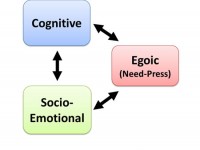As time elapses, research findings get updated, consolidated, and what was originally left out or stayed unseen is clarified. An example of this historical process is CDF, the Constructive Developmental Framework created by Otto Laske between 1999 and 2000. 25 years after Kohlberg School research began, CDF brought together what this research separated or left standing in isolation. CDF is a synthesis that connects all that this research brought to light about the human self. So far, the CDF synthesis has been treated as separate from, and other than, Kegan's, Basseches' and Fowler's research. The time has come to acknowledge that CDF transcends ideology, however well defended, and is a step beyond the original research of the Harvard School. Convince yourself by reading the actual texts that constitute CDF, which has three components: a refined version of Kegan's research on the social-emotional self a refined version of Basseches' research on the cognitive self, with inclusion of Roy Bhaskar's updating of the notion of adult cognitive development an integrated component regarding the psychological self as seen by Moris Aderman, student of Henry Murray's, called 'Need-Press' (see www.needpress.com). Texts on these components of CDF have been made available in pdf form found... Read More...
Tag: Psychological Profile
An Artificially Intelligent CDF Coach: Considerations regarding App-Based Executive Coaching
In this blog, I briefly sketch a coaching app based on CDF. I detail an elementary design of the app and outline its purpose, function, and main benefits. Since learning CDF through workshops takes dedication and a level of concentration rare in present times, the blog suggests that: (a). learning to build apps for CDF-based coaching may be the optimal and quickest way to learn CDF; (b). since the majority of coaches is stuck in logic-based behavioral coaching, executives can expect a value-add from being coached based on the CDF-app designed in this blog. Of course, building such an app requires people who simultaneously have experience building apps as well as a strong interest in delivering quality coaching. Two kinds of CDF workshops seem to be needed: 1. App-free: conventional, 2-4 day, workshops introducing students to the basics of CDF and providing opportunities for practicing developmental thinking with a client, also in preparation for building CDF-apps. 2. App-focused: a workshop geared directly to building a CDF-app. The first kind of workshop focuses on learning to embody a "CDF-stance" and "persona"; the second kind, on bringing CDF basics into a programmable form and shaping them in terms of the requirements of... Read More...
A methodology for creating a developmentally aware society
Until quite recently, the notion that adults develop over their entire lifetime has been a well kept academic secret. It still is. Attempts at establishing “deliberately developmental organizations” (DDO’s; Kegan & Lahey 2016), based on 40 years of research in adult development, are quite recent. This article introduces to the Constructive Developmental Framework (CDF), a synthesis of adult-developmental research since 1975 that has been taught as well as practiced at the Interdevelopmental Institute since 2000 (). CDF is a new tool for understanding how people experience life and work, mostly without full consciousness. This qualitative understanding emerges from semi-structured 1-hour interviews which shed new light on how people construct their workplace internally, both individually and in teams. CDFs main strength in business lies in providing new tools for boosting, through dialog, two human capabilities: making meaning of experiences (called “social-emotional”) and making sense of the real world conceptually (referred to as “cognitive”), as further explained below. Viewed more broadly, CDF comprises a political dimension as well. It is a framework for coaching for society, in the sense of developing self-authoring citizens who can think independently, rather than in dependence on internalized or external others. At the present time, where algorithms... Read More...
What is CDF: An Introduction for Beginners
This article introduces to the Constructive Developmental Framework (CDF), addressing those readers who want to learn to use the methodology. CDF is seen as a comprehensive framework for consulting and coaching, much like NLP, but on a higher level of consciousness. Its main intellectual strength lies in establishing a methodology for the deconstruction, through dialog, of less developed thinking and meaning making, for the sake of client benefit. Viewed more broadly, CDF is a framework for “coaching for society” that can lift individuals’ and teams’ developmental level. What is CDF -- An Introduction for Beginners Read More...
How Do You Teach Your Client to Think Developmentally?
The article is based on a dialog between a mentor and a behavioral coach who desires to learn to think developmentally. After an introduction on coaching focused on clients’ Frame of Reference, the four individual dialogs deal with the three aspects of human capability, the nature of developmental scores, the nature of behavioral “need-press” scores, and the synthesis of CDF data for use in coaching practice. Laske 2007 Mentoring a Behavioral Coach to Think Developmentally Read More...
Introduction to the three CDF Dimensions (Self-Study)
This course introduces students to a widely acclaimed, holistic perspective on both individuals and teams. It is an overview course focused the three perspectives in which CDF-users view clients: the social-emotional, cognitive, and psychological one. Insight into these dimensions stems from decades of validated research since the 1970s but has not been widely taught in a unified fashion. In the course, emphasis is placed as well on the interrelationships between the three dimensions since they closely interact in coaching as well as consulting. Based on this course, students become eligible for all other CDF courses. Read more Read More...
